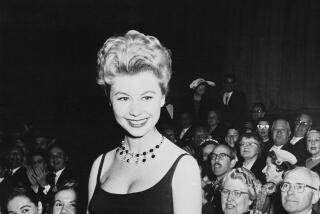‘Mad Men’s’ Robert Morse revisits ‘How to Succeed in Business Without Really Trying’

More than four decades before he earned five Emmy nominations for his performance as the eccentric and often shoeless Bertram Cooper, founding partner of the ad agency Sterling Cooper on “Mad Men,” Robert Morse was climbing the corporate ladder in the Broadway smash musical “How to Succeed in Business Without Really Trying.”
Morse was the toast of Broadway in the comedy as the impish and ambitious J. Pierrepont Finch (“Ponty”) who, thanks to Sherman Mead’s book “How to Succeed in Business Without Really Trying,” makes the leap from window washer to executive at the World Wide Wicket Company. Along the way, he falls in love with company secretary Rosemary.
Featuring a fabulous score by Frank Loesser (“I Believe In You,” “Rosemary,” “A Secretary Is Not a Toy” and “Company Way”), a smart book and equally perceptive direction by Abe Burrows, and musical staging by none other than Bob Fosse, the show ran from 1961-65 on Broadway, earning seven Tonys — including one for Morse — and even the Pulitzer Prize.
“John F. Kennedy came to see the show,” recalled Morse, who is still boyish at 88. “He came backstage and shook my hand. He sent me a lovely, lovely picture, ‘With Esteemed and Best Wishes, John F. Kennedy.’ Those are the memories that I now hold on to because as you get older, sometimes you think ‘Oh my God, I didn’t do anything.’ And then you go to IMDb and you look at everything you’ve done and go, ‘Hey, be proud of yourself.’”
And he definitely should be proud of the 1967 film version of “How to Succeed,” which screens Aug. 14 at the American Cinematheque’s Aero Theatre. Morse will be in conversation with Oscar-nominated and Emmy Award-winning screenwriter/producer Larry Karaszewski (“Ed Wood,” “The People vs. Larry Flynt” and “The People vs. O.J. Simpson).
“I really love this film,” said Karaszewski, who worked with Morse on the Simpson miniseries.
Karaszewski believes most of the Broadway musicals that were turned into films in the 1960s don’t hold up very well because “they try to preserve that Broadway experience that I sometimes don’t think necessarily translates well to film, but ‘How to Succeed in Business’ kicks [butt] as a movie. It’s light on its feet. It’s charming, it’s beautifully directed by David Swift.”
In those days, Hollywood rarely cast the Broadway leads in the film versions. Rex Harrison reprised his role as Professor Henry Higgins in 1964’s “My Fair Lady,” but producer Jack L. Warner passed over Julie Andrews, who played Eliza Doolittle on Broadway, and cast Audrey Hepburn.
But in the case of “How to Succeed,” Morse, Rudy Vallee, who played the stuffy World Wicket boss Jasper Biggley, and Michele Lee, who took over the role of Rosemary on the Great White Way, also reprised their Broadway roles.
Former Disney animator Swift, best known for writing and directing 1961’s “The Parent Trap,” wrote, directed and produced “How to Succeed,” earning a Writers Guild nomination for the script.
“How to Succeed in Business” is a Midcentury Modern dream thanks to Robert Boyle’s sleek minimalist design. And the color scheme was designed by Mary Blair, the acclaimed artist, animator and designer who did concept art for Disney films such as 1950’s “Cinderella.” And another former animator, Virgil Partch, is credited for his visual gags.
Despite good reviews, the film didn’t succeed at the box office.
Still, Morse has fond memories of seeing “How to Succeed” at Radio City Music Hall. “That was quite a thrill for me, living in New York, to go to Radio City Music Hall. If I cried a tear, it looked like Niagara Falls because of the hugeness of the screen.”
It was also a thrill to get the opportunity to reprise his role in the film version. “I mean how many actors get a chance to do what they did on Broadway on film?”
Missing from the Broadway cast was Charles Nelson Reilly, who also won a Tony as Bud Frump, Biggley’s weasel of a nephew. Anthony Teague plays Frump in the movie.
“I never found out why he didn’t do the movie,” said Morse. “He never wanted to talk about it. David Swift didn’t talk about it. Not that I am belittling the person who played the part, but I missed the original.”
Also missing from the movie are Rosemary’s songs — “Happy to Keep His Dinner Warm” and “Paris Original” — though she sings “I Believe in You” to Finch. In the play, it is only Ponty who performs the ballad.
The female workers at World Wide Wicket definitely needed the #MeToo movement back in 1967. Just as with “Mad Men,” the women who work at the company are relegated to secretaries and receptionists and often have to fight off the advances of bosses. One of the big highlights of the film is “A Secretary Is Not a Toy,” which perceptively skewers the sexist office politics of the era.
Morse loved working with Vallee, who had come to fame more than 30 years earlier as a singer and radio star and honed his comedic skill in such movies as Preston Sturges’ 1942 “Palm Beach Story.”
“Everyone loved him,” he said. “I adored him. We had wonderful times. He’d invite me to his house for dinner on the weekend. I went to his house several times and played tennis with him.”
'How to Succeed in Business Without Really Trying'
Where: Aero Theatre, 1328 Montana Ave., Santa Monica
When: Aug. 14, 7:30 p.m.
Price: $12; $8 for Cinematheque members
Info: (310) 260-1528 www.americancinemathequecalendar.com
More to Read
The biggest entertainment stories
Get our big stories about Hollywood, film, television, music, arts, culture and more right in your inbox as soon as they publish.
You may occasionally receive promotional content from the Los Angeles Times.











